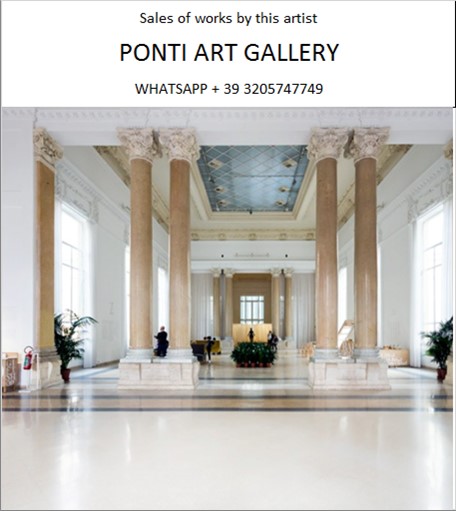Ponti Art Gallery is interested in buying and selling works
of art by this artist.

Biography
Donald Clarence Judd, born on June 3, 1928, in Excelsior Springs, Missouri, emerged as one of the most significant American artists of the twentieth century. His radical ideas and work continue to provoke and influence the fields of art, architecture, and design. Judd's journey into the realms of art and philosophy began after his service in the United States Army in Korea from June 1946 until November 1947. Upon his return, he pursued education in philosophy and art history at Columbia University and painting at the Art Students League, laying the groundwork for his future contributions to the art world.
From 1959 to 1965, Judd worked as an art critic, writing over a dozen reviews a month, a practice he continued throughout his life. Initially a painter, Judd transitioned to creating work in three dimensions in the early 1960s, marking a pivotal shift in his career and the broader landscape of contemporary art. He advocated for the importance of art and artistic expression, writing extensively on land preservation, empirical knowledge, and engaged citizenship.
Judd's ideas concerning the permanent installation of artwork first materialized in New York, at 101 Spring Street, a five-story cast-iron building he purchased in 1968. He later expanded his vision to Marfa, Texas, in 1973, where he continued permanently installing his work and that of others until his death in 1994. These spaces, including studios, living quarters, and ranches, reflect the diversity of his life's work. Judd established the Judd Foundation in 1977 and the Chinati Foundation in 1986, both aimed at preserving his art, spaces, libraries, and archives as standards for the installation of his work.
Judd's work was exhibited throughout the United States, Europe, and Asia, with his work included in museum collections worldwide. Major exhibitions of his work were held at prestigious institutions such as the Whitney Museum of American Art, New York; the National Gallery of Canada, Ottawa; Stedelijk Van Abbemuseum, Eindhoven; Tate Modern, London; and The Museum of Modern Art, New York.
Judd's early work as a painter laid the foundation for his later explorations in three-dimensional forms. By the late 1950s, he began writing art criticism, engaging deeply with the art world. His transition to "object-making" in the early 1960s represented a radical departure from traditional art forms, leading to the creation of his iconic "stacks" and other geometric forms. Judd's work, characterized by its emphasis on materials, colors, and scale, challenged conventional notions of sculpture and painting. He was influenced by artists such as Mark Rothko, Barnett Newman, and Jackson Pollock, yet his work was distinct in its avoidance of personal expression and its focus on the object itself.
Judd's approach to art-making was revolutionary, employing fabricators to realize his visions and participating in a shift that deprioritized the artist's hand in the creation process. His interviews and writings reveal a disciplined practitioner with a clear aesthetic vision, unafraid to critique the art establishment and advocate for political causes. Judd's work in Texas, particularly his efforts to preserve the natural and cultural landscape of Marfa, further demonstrates his commitment to integrating art, architecture, and environment.
Throughout his career, Judd received numerous accolades and his work has been the subject of extensive scholarly attention. His writings, particularly "Specific Objects" (1964), articulate his philosophy and have had a lasting impact on the discourse of contemporary art. Judd's legacy is preserved through the Judd Foundation and the Chinati Foundation, which continue to foster engagement with his work and ideas.
Donald Judd passed away on February 12, 1994, in New York City, but his influence endures. His work challenges viewers to reconsider the relationship between art, space, and perception, making him a central figure in the Minimalist movement and a pivotal figure in post-war American art.
Donald Judd Quotes and Sales
of Works
Ponti Art Gallery selects and deals with paintings by the
artist. Upon request, we provide free estimates and
evaluations, communicate prices, quotations, and current
market values.
If you are interested in BUYING or SELLING works by the
artist, contact us immediately.
If you wish to sell or receive an evaluation of the
works:
Send us a frontal photo of the painting, one of the back,
and one of the signature. Also, indicate the dimensions of
the work. Inform us about the purchase origin of the work
and any kind of available documentation (purchase
receipts, certificates of authenticity, publications). One
of our operators will respond to you on the same day. We
guarantee maximum confidentiality and extreme
professionalism.
If you wish to purchase works by the painter: Contact us
and let us know your request. We will inform you about the
available works. We also offer the possibility to
subscribe to our NEWSLETTER, through which you will be
informed at the beginning of each month about the latest
acquisitions of the art gallery.
You can send us pictures of the work:
